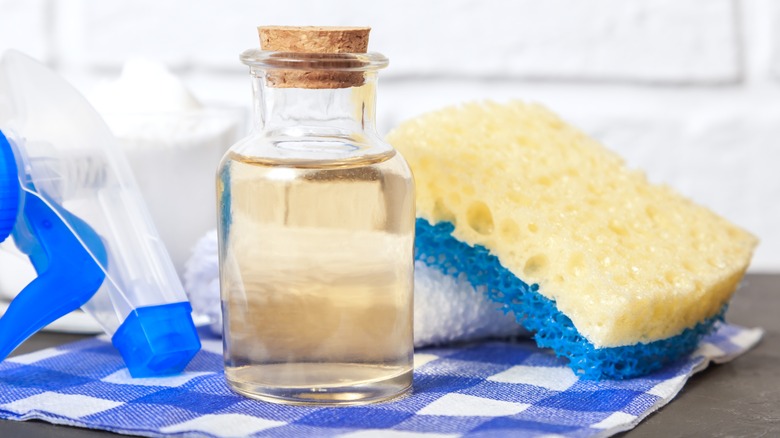The Main Mistake To Avoid When Cleaning With Vinegar
According to Almanac, the word vinegar comes from the French vin aigre, meaning sour wine. It is the product of sugars in fermented fruits, vegetables, or grains. Vinegar also contains water and varying amounts of acetic acid, with 4% being the least acidic. Vinegar is also a superhero when it comes to household cleaning needs — it's good for washing windows, unclogging drains, killing weeds, descaling coffee makers — the list goes on and on. And you can even drink it!
However, it is a big mistake to assume it is appropriate to clean any surface with vinegar. In fact, it is risky to use it on various floor types, certain countertops, or waxed furniture. Painted surfaces, some metals, and screens on electronics can be damaged as well. Improperly targeted, vinegar can cause discoloration, peeling, dissolving, or be ineffective at best. And the results might be permanent. This popular cleaning crusader can be transformed into a supervillain if you use it to clean surfaces that are not vinegar-compatible.
There is some conflicting information regarding the proper use of vinegar as a cleanser, but it is better to be safe than sorry. Knowing where not to apply it, and perhaps resorting to a more conservative approach before using vinegar may save you aggravation and unnecessary expenses. Be sure to avoid another main mistake: Sunrise Industrial Cleaners advises never mixing vinegar with bleach or else you risk creating toxic acids or deadly chlorine gas, even at low levels.
Use with care on countertops and wood floors
Stone countertops and vinegar are not a good match. Used as materials for countertops, porous stones such as granite and marble are polished and have sealants to protect their natural pits, pores, and fissures. Per In The Wash, vinegar will cause the sealant to deteriorate over time. According to Consumer Reports, acetic acid can etch the surface of a countertop and fade its natural stone luster. The once smooth and shiny countertop will become cloudy and its texture will be roughened by vinegar's corrosive effect.
Vinegar is also a cleaning no-no for other stones including onyx, travertine, limestone, and soapstone. As a less destructive alternative to vinegar, The Make Your Own Zone recommends cleaning granite or marble countertops with a solution of water, dish soap, and rubbing alcohol. An even less aggressive approach omits the alcohol while using a plastic scrub pad is a gentle way to address trouble spots.
It is possibly also a mistake to use vinegar to clean a hardwood floor, whose polyurethane, wax, or other finish would be at risk. Try cleaning a hardwood floor with a gentle substitute before escalating to vinegar, or test the harsher cleanser on a small, less visible part. Consult the manufacturer's instructions, and be mindful that an application of vinegar may void a floor's warranty.
Don't clean these other surfaces with vinegar
Anita's Housekeeping Referral Agency asserts that vinegar and most metals are a corrosive mix, and recommends using it cautiously on appliance surfaces, metal countertops, or utensils. Vinegar is inappropriate for cleaning stainless steel, cast iron pans, or knives. Iron and aluminum are reactive to acetic acid and vinegar can leave them blotchy as well. Real Homes details the damage vinegar can cause on painted wood surfaces such as those used on a cabinet. Unless heavily diluted, vinegar's pH level of 2.4 will soften the paint and result in peeling.
Grout and a tile surface are also susceptible to damage from vinegar. According to Real Simple, the cleanser will wear away the finish on tiles and break down the grout, and also impact the area underneath. A mirror's surface can be wrecked by cleaning it with vinegar. It can penetrate the glass coating and ruin the silver backing. Moreover, using vinegar on electronics is also not a good idea, as doing so can diminish the screen's responsiveness to touch. As a general rule, thoroughly rinse vinegar after use on any surface, to remove any acid residue and minimize its pungent odor.


